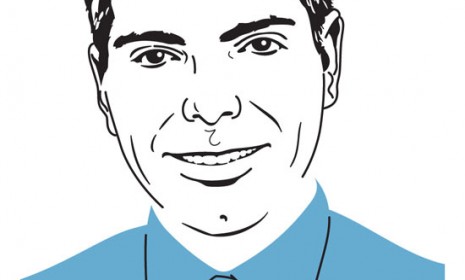The incredible shrinking manufacturing sector
President Obama has an unexpectedly frank message for blue-collar workers: Kiss your jobs goodbye


A free daily email with the biggest news stories of the day – and the best features from TheWeek.com
You are now subscribed
Your newsletter sign-up was successful
Call Bruce Springsteen a prophet. "These jobs are going boys, and they ain't coming back," roared The Boss in his Reagan-era song "My Hometown."
During the second presidential debate, President Obama echoed those lyrics. Today, only 9 percent of Americans work in manufacturing jobs. American industry has declined on Obama's watch — something he readily admits to. During Tuesday night's debate, he channeled Springsteen, saying that "some jobs are going, and won't be coming back."
Part of this is unavoidable. It has to do with globalized markets and outsourcing. The obvious benefits of high productivity and low wages overseas is irresistible to many businesses. It has to do with immigration and technology. Meanwhile, American industry is becoming more productive and efficient — a good thing, except that it means we can create more stuff with fewer workers.
The Week
Escape your echo chamber. Get the facts behind the news, plus analysis from multiple perspectives.

Sign up for The Week's Free Newsletters
From our morning news briefing to a weekly Good News Newsletter, get the best of The Week delivered directly to your inbox.
From our morning news briefing to a weekly Good News Newsletter, get the best of The Week delivered directly to your inbox.
The good news, the president tried to reassure us, is that the void left by these disappearing manufacturing jobs will be filled by high-paying, high-skills occupations. Whether that's true or not, there's an obvious point he did not state: Many Americans will be left behind in the process. As the world changes, some people simply can't — or won't — adapt. And the president's vision leaves those Americans behind.
This isn't a Republican or Democratic problem. There's plenty of bipartisan blame to go around.
Manufacturing jobs were once the cornerstone of American industry. You could graduate from high school (or not) and get a job in a factory that would pay you enough money to support a middle-class family. However, during the Reagan era, manufacturing declined significantly, setting in motion a trend that lasted through both Bush administrations as well as the Clinton administration. This isn't a Republican or Democratic problem. There's plenty of bipartisan blame to go around.
Ironically, the 2012 candidates seem to have reversed their traditional partisan roles on this issue. Clearly, President Obama's public declaration that some jobs just aren't coming back is a pretty big break from the messianic hope-and-change rhetoric. Indeed, Obama is going the social Darwinist/truth-speaking realist route, while Romney is playing the quixotic populist panderer/China-basher.
A free daily email with the biggest news stories of the day – and the best features from TheWeek.com
This is unfortunately a microcosm of the serious challenges facing America. Romney's vision doesn't seem to be realistic — and Obama's doesn't seem sustainable (not without boxing millions of blue-collar, working-class Americans out of the workforce, that is). The kinds of jobs that will be in demand in a revamped economy — technology, education and health care — are not accessible to people without a college degree. And neither candidate is offering a realistic, specific plan to help hard-working but less-educated Americans find jobs.
Obama promised more spending on roads and bridges, which could help create jobs, but he also believes that to successfully replace dead manufacturing jobs, America needs to invest in science and research. He wants jobs that "that will create the next Apple, create the next new innovation that will sell products around the world." Doesn't sound like the sort of job that someone who spent two decades working the assembly line at a Jeep plant is immediately qualified for. Someone ought to tell Obama that the upcoming election may very well hinge on states like Ohio and Michigan and Wisconsin. Those states are home to a whole lot of laid-off manufacturing hands.
But back to the Boss. The rock legend once lamented the sad exodus of America's manufacturing jobs. But these days? He's backing Obama. In a message posted on his website this week, Springsteen said: "Obama's a president who has a vision that includes all of our citizens, not just some." But what about our hometown?
Matt K. Lewis is a contributing editor at TheWeek.com and a senior contributor for The Daily Caller. He has written for outlets including GQ Politics, The Guardian, and Politico, and has been cited or quoted by outlets including New York Magazine, the Washington Post, and The New York Times. Matt co-hosts The DMZ on Bloggingheads.TV, and also hosts his own podcast. In 2011, Business Insider listed him as one of the 50 "Pundits You Need To Pay Attention To Between Now And The Election." And in 2012, the American Conservative Union honored Matt as their CPAC "Blogger of the Year." He currently lives in Alexandria, Va.
-
 Tourangelle-style pork with prunes recipe
Tourangelle-style pork with prunes recipeThe Week Recommends This traditional, rustic dish is a French classic
-
 The Epstein files: glimpses of a deeply disturbing world
The Epstein files: glimpses of a deeply disturbing worldIn the Spotlight Trove of released documents paint a picture of depravity and privilege in which men hold the cards, and women are powerless or peripheral
-
 Jeff Bezos: cutting the legs off The Washington Post
Jeff Bezos: cutting the legs off The Washington PostIn the Spotlight A stalwart of American journalism is a shadow of itself after swingeing cuts by its billionaire owner
